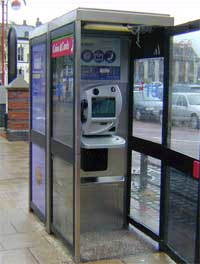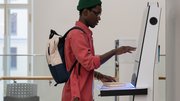Article
BT plans world's largest Internet kiosk network
In Britain, a project to install 20,000 Web payphones is underway. It's the most ambitious project of its kind in the world, and plans to expand to other countries are in the works.
February 11, 2003
British Telecommunications (BT) has embarked on a highly ambitious project to replace its payphone estate with fully interactive terminals connected to the Internet via broadband links. By 2007, BT plans to have rolled out a network of 20,000 public Internet kiosks throughout Britain. The UK telco claims that its interactive kiosk plans are the most advanced of any telecoms operator in Europe or indeed the world.
The rollout program started in February 2002, when BT, the dominant telecoms operator in the UK, deployed its first Web payphones. BT is installing around 100 web kiosks a month, and expects to have 2,000 in place by the end of March 2003. The telco expects to see more than 50 million hits a week on its kiosks, once the rollout is completed.
By contrast to the UK, the German Web payphone market is growing very slowly, says Brahim Chentouf, product marketing manager, multimedia, at kiosk supplier IPM Deutschland. German telco Deutsche Telekom has installed around 1,000 of IPM's TeleKiosk "phone and surf stations."
"Every year, we expect an `explosion' in the market, but unfortunately it has not happened yet," Chentouf said.
Replacing the Payphone
The massive surge in popularity of cellphones was the driver for BT's Internet kiosk rollout. "The idea for the project goes back to the late 1990s, when we first began to see an impact on our payphone revenues from the cellphone revolution," said Andy Green, general manager at BT Multimedia, BT's payphone arm. "We were looking to find a new revenue stream as payphones were so badly hit. Between 1999 and 2002, we lost 37 percent of our revenues from payphones due to the growth of the pre-paid cellphone market."
Because its operating license includes a universal service obligation, BT must operate a payphone network throughout the UK. "We have a 90 percent share of voice revenues from payphones in the UK," Green said. "But we have been thinning down our payphone estate, while still complying with our universal service obligation. For example, in city centers, where we used to have five payphones back-to-back, we now just have two or three or four."
 |
BT's public web payphone |
"By offering services from their payphone kiosks, such as e-mail, high-speed web browsing or local information, BT can generate extra revenues," said Kinza Povey, head of marketing at Marconi Interactive Systems, the company supplying BT's Web payphones. According to Green, BT expects to see a payback from its investment within two years.
"Time is now a valuable asset for people," Green said. "For example, when they are out and about, they may need to top up their mobile phone at one of our kiosks, or access the web. Our kiosks are secure -- you can use a credit card to pay for data time, and once the transaction is completed, your card details are wiped from the terminal's memory."
Green said BT is considering adding a swipe card reader to its terminals for extra security, so customers won't be required to type in their card details. "We are talking to a number of retailers about this, as they are interested in installing our terminals in their shops," said Green. "They would use the terminals as unattended self-service devices."
Currently, cash accounts for 80 percent of payments made at BT payphones, Green said. BT is keen to increase the proportion of card payments, to lessen the risk of theft.
Placement plan
BT has two strategies for deploying its kiosks. First, they can be installed on the street as a replacement for BT's existing payphones. But because of the risks of vandalism, this option is not as attractive as the alternative -- installing kiosks in semi-supervised locations such as railway stations, airports, shopping malls, hotels, banks or retail outlets. These kiosks can either be branded under the site owner or retailer's name or co-branded by BT and the site owner or retailer.
"The site owner or retailer shares revenues from the kiosks on their premises with BT," said Green. Another source of revenue for BT is advertising on the glass walls of its kiosks. Green said BT is keen to integrate the "glass advertising" with the content available on the kiosks, so a consumer could, for example, see an advert for Interflora on the kiosk wall, and then log on to the Interflora Web site and order some cut flowers.
"We are looking at the possibility of providing a printing facility, so people could print out card receipts or tickets," Green said. "Rather than build a printer into the kiosk, we would set up a data link to a nearby shop, which would print out the receipts or tickets for the customers." Another idea is to provide a facility for business travelers to hook up laptops to a kiosk and then link up to their corporate intranet.
BT leases its kiosks from Marconi under a revenue-sharing agreement. Marconi is supplying two different kiosk models -- the Neptune 800 for high-street locations, and the Neptune 1000 for semi-supervised premises.
The kiosks feature a built-in keyboard, trackerball and colour touch-sensitive screen. Customers can look at Web sites, send e-mails to PCs or text messages to cellphones, and also make payphone calls. "Hot buttons" give access to news, sports, shopping, games, weather forecasts, local maps and information about shops and restaurants. The sites available via the "hot buttons" include telephone directory enquiries (yell.com and Thompson Directories); news (BBCi); sportinglife.com; The Weather Index; Amazon, Argos, Interflora and Ticket Master; and datingagency.com.
"People who aren't familiar with PCs find the kiosks very easy to use," said Marconi's Povey. "Also, it is far easier to send a text message from a kiosk than from a cellphone." As in other countries, cellphone text messaging has proved phenomenally popular, particularly among young people.
A banking industry insider expressed some skepticism about BT's ability to penetrate the UK financial services industry with its kiosks. "One problem BT is going to face is software compatibility," the insider said. "If a bank already has Wincor NixdorfATMs in its branches, the logical approach will be to install Wincor Nixdorf self-service kiosks, because the software will be compatible with the ATM software. Also, British banks are interested in rolling out web-enabled software on their ATMs, and they will want any kiosks they deploy to interconnect with this software."
The source said UK banks feel BT "has a core competence in telecoms, but has not yet demonstrated an ability to deliver a viable self-service solution for banks. Kiosks are important for banks, as they represent an intermediate step between web-enabled ATMs with low-level kiosk capability and full-blown Internet banking. Banks want people who don't have Internet access at home, to be able to come into the branch and sit down at a kiosk and find out about products they might want to buy."
Other Markets
One market receptive to kiosks is the government sector, which in the UK comprises both local and national government services. Under the Blair administration's "e-government" initiative, all local government services are due to go online by 2005. (see story, Government Gets in the Kiosk Game in UK) People will be able to pay local taxes electronically and find out about local government services on the web. "BT and Marconi are talking to a number of local government organisations about deploying the kiosks," Povey said. "Kiosks make an ideal platform for e-government."
Marconi plans to export its kiosk technology to markets outside the UK. In Spain, Telefonicais testing 30 Marconi kiosks in a pilot due to end in February 2003. According to Povey, Telefonica plans to deploy 1,000 kiosks by the end of 2003, investing EUR 10 million in the project.
Marconi has also supplied 10 kiosks to Telecom Asia, a second-tier telecoms operator in Thailand, for a trial of interactive kiosk technology. "The applications available on the kiosks being deployed in Spain and Thailand are the same as on those operated by BT," said Povey. "But the Thais are trialing video e-mails, allowing tourists to send a photograph of themselves to friends or family at home."










